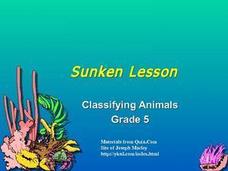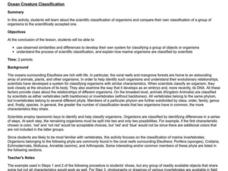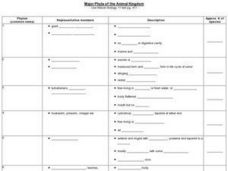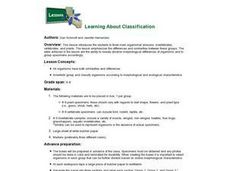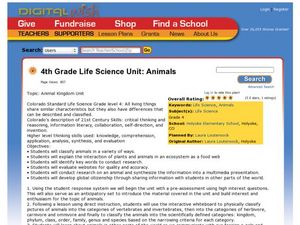Curated OER
Classifying Animals
Students classify animals into vertebrates and invertebrates. In this animal classification instructional activity, students complete the online activity by dragging the animals into the correct groups. Students classify animals as...
Curated OER
Sunken Lesson: Classifying Animals
This PowerPoint features vocabulary and key concepts related to animal classification. Information about levels of classification, traits common to vertebrates and invertebrates, and a description of metamorphosis are included. The text...
Curated OER
Invertebrates
Students identify the characteristics common to all animals. In groups, they compare the characteristics between the animals and how they are divided. To end the lesson, they compare the eight phyla of invertebrates and review the...
Curated OER
Animal Classifications
Third graders work in small groups to investigate how to sort a variety of items into groups and subgroups. They work on a class chart based on the activity which show how the items are classified based on commonalities. Upon completion...
Curated OER
Ocean Creature Classification
Students develop their own system for classifying a group of objects or organisms using observed similarities and differences. They investigate the process of scientific classification, and explain how marine organisms are classified by...
Curated OER
Major Phyla of the Animal Kingdom
In this animal kingdom worksheet, students compare and contrast the 10 different phyla including the description and approximate number of species found in each one. This worksheet is a graphic organizer.
Curated OER
Internet Invertebrates Scavenger Hunt
In this invertebrates scavenger hunt activity, students research on the Internet 10 various types of invertebrates. They read each question first to determine what they need to look for on the Internet. Then, students respond to each...
Curated OER
Learning About Classification
Learners explore the three main organismal divisions. Students classify organisms by invertebrates, vertebrates, and plants. They observe the differences and similarities between these groups.
Curated OER
Introduction to Animals
The details about invertebrates and invertebrates give valuable information about the characteristics of multicellular organisms. Examples of nutrition styles and symmetry are interesting. Also, these slides are clear in presenting a...
Casimir Middle School
Biological Classification Worksheet
Classify living things with a set of worksheets that has pupils sorting and indentifying living and non-living things. Learners use the worksheets as a basis for finding their answers.
Curated OER
Animal Classification
In this animal classification worksheet, students will write in 5 examples of vertebrate animals and 6 examples of invertebrates. This worksheet is a graphic organizer.
Curated OER
The Five Classes of Vertebrates
What a terrific lesson plan! Learners discuss the animal kingdom, and classify them as vertebrates and invertebrates. They also identify them as fish, amphibians, reptiles, birds, and mammals. There is even a taxonomic breakdown of...
K-State Research and Extensions
You Ol’ Fossil
Geologists are gneiss, tuff, and a little bit wacke. The fifth chapter of seven includes ten activities at four different levels. The hands-on activities cover fossils including how they are formed, vertebrates, invertebrates,...
Curated OER
Scientific Classification
In this scientific classification worksheet, students read about classification and the questions scientists ask in order to classify, then read about features of different classifications of animals. Worksheet is informational, no...
Curated OER
So You Think You're Tough
Fourth graders learn how to classify animals. In this invertebrates lesson, 4th graders discuss how we classify thinks into groups and move into a discussion about classifying animals. Students learn about the differences between...
Curated OER
Classifying Vertebrates
Second graders study animal characteristics and classification. In this animal characteristics and classifications activity, 2nd graders determine how to classify vertebrates which include mammals, reptiles, amphibians, birds, and fish....
Curated OER
What Is a Species?
Students are able to recognize that scientists use different definitions of species. They are able to assess the strengths and limitations of species definitions depending on their context. Students are able to use definitions of...
Curated OER
4th Grade Life Science Unit: Animals
Fourth graders classify animals. In this animal kingdom lesson, 4th graders research animal habitats and behaviors. Students connect to a zoologist via SKYPE and learn about animal classification. Students blog about preserving animal...
Virginia Department of Education
Animal Phyla and Plant Divisions
Searched hours for an activity that allows individuals the ability to use multiple resources to learn about both plant and animal kingdoms? This discussion and activity provide pupils with the ability to visualize each organism before...
Curated OER
Invertebrates and Vertebrate Evolution
Students explore the major characteristics of the major animal phyla. They describe adaptive features that have contributed to the success of animals on land. Students explain how primate evolution provides a context for understanding...
Curated OER
Show Some Backbone and Teach Invertebrates
Fifth graders identify two similarities and two differences between two phyla, assign fictitious invertebrate to its phylum and explain why it belongs in that grouping, and construct member of given phylum and explain why it should be...
Curated OER
Insects?
Can you tell the difference between a bug and an insect? Aren't they the exact same thing? Let your learners explore, identify, classify, and document the differences they see in bugs and insects. The activity sheet suggests several...
Curated OER
Microfishing
Learners use a simple method to collect living microorganisms from natural and/or artificial environments and develop skills in microscopy, observation, drawing, speculation, hypothesizing, oral presentation, and raising questions.
Biology Junction
Arthropods
Even the creepy crawlers have pretty amazing anatomy! A thorough lesson describes characteristics of arthropods with an emphasis on their structures. Beginning with a review of the taxonomy hierarchy, the lesson explains the different...



